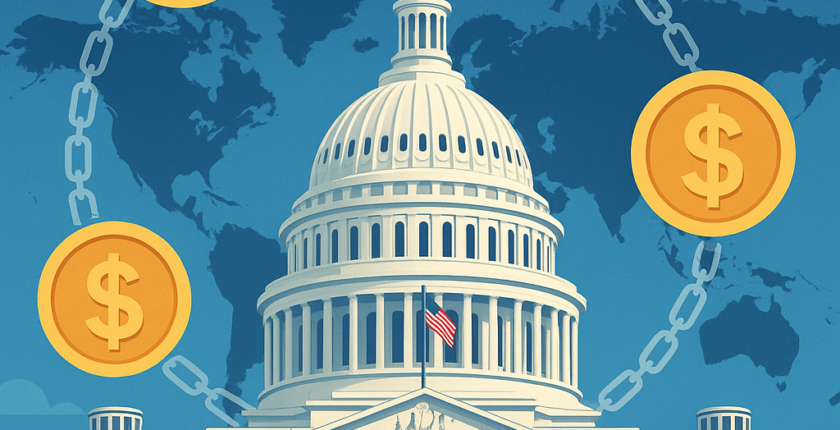GENIUS Act Passes Senate: The U.S. Just Set the Stage for Stablecoin Regulation — And the World Is Watching
📅 Date:
2025-06-20
Main Takeaways
- In a decisive 68-30 vote, the U.S. Senate passed the GENIUS Act (Guiding and Establishing National Innovation for U.S. Stablecoins) — a historic, bipartisan breakthrough in digital asset regulation.
- Co-sponsored by Senators Tim Scott, Bill Hagerty, Kirsten Gillibrand, and Cynthia Lummis, this is the first federal bill creating a national framework for how stablecoins should be issued, governed, and supervised.
- The act mandates 1:1 reserve backing, public disclosures, consumer safeguards, and a ban on yield-bearing and algorithmic stablecoins.
- If passed by the House and signed into law, it would reshape stablecoin adoption across crypto, fintech, and traditional finance, while positioning the U.S. as a regulatory leader in digital finance.
A Bipartisan Breakthrough for Digital Assets
After years of fragmented policy debates, mixed regulatory signals, and enforcement-based crackdowns, the GENIUS Act marks a pivotal shift toward constructive, forward-looking crypto policy in the U.S. Backed by both major parties, this legislation signals growing recognition of stablecoins’ strategic importance — not only for crypto enthusiasts, but for the U.S. dollar’s influence in an increasingly digital global economy.
For digital asset builders and institutions, the message is clear: the U.S. is ready to regulate, not eradicate, responsible innovation.
What the GENIUS Act Actually Covers
The GENIUS Act focuses specifically on “payment stablecoins” — digital tokens designed for everyday payments and business transactions, pegged to stable assets like the U.S. dollar.
📌 Key provisions include:
- 1:1 Reserve Backing:
Issuers must back every token in circulation with liquid, high-quality assets like U.S. dollars or short-term Treasury securities. Monthly public disclosures and mandatory audits for large issuers (over $50 billion) will enforce this rule. - Ban on Yield-Bearing and Algorithmic Stablecoins:
The bill prohibits stablecoins that offer interest-like returns and mandates a Treasury Department study on algorithmic stablecoins (those relying on supply adjustments instead of hard reserves). - Tiered Oversight Model:
Large issuers will be federally supervised by agencies like the Office of the Comptroller of the Currency (OCC), Federal Reserve, FDIC, and NCUA. Smaller issuers can operate under state licenses — unless they surpass $10 billion in circulation, at which point they must transition to federal oversight. - Custodian Standards:
Entities safeguarding reserves, tokens, or cryptographic keys must segregate user funds from company funds, legally recognize user ownership, and prioritize consumer claims in case of bankruptcy. - Foreign Stablecoin Restrictions:
Offshore issuers must register with U.S. regulators and comply with the same rules to access U.S. markets. Unregistered foreign stablecoins targeting U.S. consumers will be barred, with the Federal Reserve empowered to intervene if foreign stablecoins threaten financial stability.
What This Means for the Industry
For the crypto sector, this is less about adding new restrictions and more about finally introducing regulatory clarity. The GENIUS Act essentially codifies best practices already followed by responsible issuers, while giving them a clear legal framework to expand services, secure partnerships, and integrate with mainstream financial systems.
It also raises the bar for offshore issuers, who will need to appoint a U.S.-based legal agent and comply with federal standards to serve U.S. customers. Non-crypto companies interested in integrating stablecoin payments may find this law lowers their legal risks, potentially sparking new entrants into the space.
That said, some in the crypto community may view the ban on interest-bearing stablecoins and limits on algorithmic models as overly cautious. Yet even skeptics acknowledge that if stablecoins are to support real-world finance, stricter standards are necessary.
What’s Next?
The GENIUS Act now moves to the House of Representatives, where it will need to be reconciled with similar stablecoin proposals like the STABLE Act. Early indicators suggest a strong chance of passage, with President Trump already expressing support and expected to sign the bill before Congress recesses in August.
Once enacted, federal agencies — led by the OCC — will begin drafting supervisory rules, licensing procedures, and compliance frameworks. Stablecoin issuers will need to prepare for a new era of oversight — but with much-needed certainty at last.
In Summary
The GENIUS Act’s Senate passage is a historic, bipartisan milestone for U.S. digital asset policy. It offers a blueprint for safe, regulated stablecoin adoption while preserving space for innovation, sending a clear message to the global crypto economy: the U.S. is open for business — on its terms.

